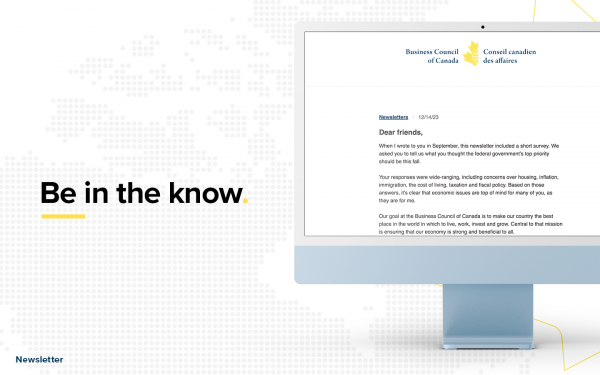Canadians can put their elbows down and keep their heads high
As published in The Globe and Mail
Mark Carney made the right call. By announcing the removal of some Canadian tariffs against U.S. products on Friday, he put the country’s long-term national interests ahead of short-term domestic politics, recognizing that the future of the U.S.-Canada-Mexico Agreement (USMCA) is at stake.
Over the next two weeks, the office of the United States Trade Representative will formally launch its USMCA review process. In so doing, Washington will send a clear signal about whether the Trump administration wants it to be extended or to expire.
Canada had to send a signal of its own. With Friday’s announcement that Ottawa would ease the countermeasures to the Trump administration’s so-called “fentanyl tariffs,” the Prime Minister made it clear that we want to preserve the preferential trade and investment relationship that has supercharged our economy for the past 40 years, rather than going back to the protectionist economic nationalism of an earlier and more insular era.
If we want the USMCA review to be successful in 2026, and ensure the vital trilateral agreement is extended beyond 2036 – and we do – Canadians must get behind the federal government’s decision to drop the retaliatory tariffs on USMCA-compliant goods.
When the Canadian government introduced these countertariffs, it did so based on the very important assumption that other countries, specifically the other G7 countries, would retaliate when the U.S. imposed tariffs on them. In the end, however, Canada was the only G7 country to impose countertariffs on the United States. In fact, we were the only country apart from China to have done so. It’s also a fact that we are the only G7 country that hasn’t negotiated a framework deal for a reduction in U.S. tariffs.
Canadians can be frustrated or disappointed that other countries didn’t follow our lead, but the moment has passed. Canada played the cards it was dealt while the other countries around the table folded. It was just us and the U.S. left in the game, and we had the short stack.
When we plan based on a strategic assumption that’s later proven wrong – whether it’s in business or in life – there’s no shame in revisiting our strategy. In fact, it’s the wise thing to do. Refusing to do so, whether out of pride or fear of looking weak, only adds misjudgment on top of miscalculation.
Canada’s retaliatory tariffs did not have any impact on U.S. trade policy, but they put our most important trade agreement at risk. U.S. Secretary of Commerce Howard Lutnick reportedly suggested jettisoning the USMCA and instead doing a bilateral pact with Mexico, which very nearly occurred during the original negotiations around the USMCA. And Pete Hoekstra, the U.S. ambassador to Canada, said repeatedly that our retaliatory tariffs were a “huge irritant” that called into question the future of the USMCA. He noted, correctly, that unlike the American fentanyl tariffs, the Canadian retaliatory tariffs didn’t exempt or exclude USMCA-compliant goods.
There’s no utility in debating how the tariff dispute started, only how it ends. Other countries opted against retaliatory tariffs – either because they worried it would provoke an escalation, or they rightly viewed import tariffs as taxes on their own citizens and businesses.
Canada couldn’t afford to maintain costly countermeasures if they undermined our good-faith efforts to preserve the USMCA. Now, we can go into the USMCA review process with clean hands and a clear conscience. We took a principled stand against tariffs and tried to lead by example. That others didn’t follow doesn’t mean that Ottawa was wrong to try; even if we put our elbows down, we can keep our heads high.
The USMCA is simply too important to our national economy. If we lose the trilateral agreement, Canadians will suffer. It will also mean the end of the USMCA exemption on the Trump administration’s tariffs, meaning all Canadian exports to the U.S. would face tariffs of 35 per cent or more.
Now that Mr. Carney has removed many of the retaliatory tariffs, Canadians should support him, as this may be the most effective way to secure a successful outcome. Nobody wins a tariff war, but Canada would lose a trade war. We can’t allow that to happen.











